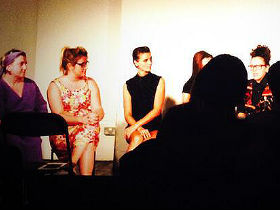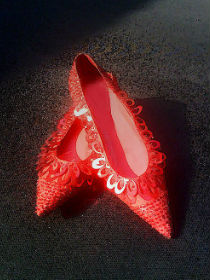saints and sinners of the stage and screen


saints and sinners of the stage and screen
The Vagina Monologues
Take Courage
18th October 2013
★★★☆☆

Photography supplied by Take Courage
Some plays sell out. They're so popular, they run again, in different venues, with different actors, sometimes big names, Hollywood names. They win awards. It's the kind of success that every playwright not-so-secretly dreams of.
Eve Ensler's now infamous The Vagina Monologues has done all of that, but it's become something more than a play. It triggered the launch of a global non-profit organisation which has raised awareness of violence against women and raised funds to help abused women. There is political theatre, and then there's this - some shows make you think, but Ensler has managed to pen something which has not just inspired thoughts but also actions. As far as legacies go, it's pretty impressive.
There's definitely acting involved, but the play is so politically charged, and it's written as a series of female characters taking it in turns to talk, rather than a straight piece of drama. It almost feels like The Vagina Monologues belongs to a new genre, one which hasn't quite been fully defined yet.
Get Over It Productions originally performed the play at the Camden Fringe, but they've now brought it to Take Courage, for a very limited run. It's a show with a lot of history, a reputation, expectations, hopes, fears - in short, staging this is a brave move for any company, even if they're all-female and should in theory relate to the work.
Ensler states that her play should have at least three actresses, but here there are seven. Each is dressed diversely, but there's an overwhelming 90s feel to their clothes. Sonia Kamel's loudly patterned waistcoat screams that it belongs to that era, and this is reinforced by carefully chosen pre-show music such as Madison Avenue's Don't Call Me Baby. Ensler originally penned The Vagina Monologues in the 90s and it's a respectful nod to date the production in this way.

Photography supplied by Get Over It Productions
The front of the stage is lined with footwear, one pair for each woman. The shoes are crimson coloured - an obvious reference to menstruation - and all of varying shapes and sizes. Curiously, not a single pair looks difficult to walk in, there's a pair of low-heeled slingbacks, but nothing too challenging - no stilettos or FMBs. Yes, many shoe designers are male, and high heels can be seen a symbol of oppression, we wear them because society expects us to, because society thinks we look better with the extra height. But some women do like heels and have an inexplicable talent for balancing in them gracefully. Feminism is about choices, women should be allowed to rebel against gender stereotypes, but they should only do so if they actually want to.
The Vagina Monologues has been rewritten so many times by Ensler that it's difficult to keep track of what she herself has hacked away at and what has been changed by director Paula Benson. But with this version a tight 55 minutes and a typical staging 90 minutes minimum, Benson has had to make some choices. The absence of I Was in the Room is keenly felt, if you're going to spend an hour talking about vaginas, it's a real oversight to miss out childbirth, one of its main functions.
One of the most challenging monologues is The Little Coochi Snorcher that Could. Originally meant for a black southern American, Benson has recast the part as belonging to a white, Irish Catholic girl. It's unclear as to why, except perhaps to suit the actress, who happens to be a white woman of Irish descent.
In this piece, the character played by Veronica Quilligan recalls a traumatic experience which made her hate her vagina, and a healing experience which helped readjust her attitude. The girl's rape at the hands of a family friend is clearly unacceptable. But the subsequent encounter with an older woman, told in beamingly positive light, doesn't seem to be any less wrong.
During this encounter, the girl is meant to be 16 - made older by Ensler following complaints - but Quilligan plays her as immature and naive. Quilligan may be the oldest actress on stage, and is dressed normally, rather than made to look like lamb, but she imbues a childishness into her entire monologue that creates a real sense of unease. There's no doubt the girl thinks, in the second instance, she is consenting but Quilligan doesn't make her come across as emotionally mature enough to make that decision. It's an unsettling moment in an hour of female empowerment - this is the only time that women are portrayed as anything less than wonderful. Did the older woman rescue the girl? Or take advantage of her?
The tone shifts constantly and there's humour throughout - Velenzia Spearpoint delivers My Angry Vagina with an enjoyable rage against tampons and gynaecologists - but there are also more touching moments. Rhiannon Kelly soulfully delivers My Vagina was My Village, a monologue about the appalling rapes suffered by a Bosnian girl. It's hard to listen to, particularly with the knowledge that the play is based on interviews with real women, rather than imagined by the playwright - but it's an important inclusion.
The piece ends with Tania Kieffer's brilliant rendition of The Woman Who Loved to Make Vaginas Happy, a monologue about a lawyer turned sex worker, who only dealt with female clients. Kieffer takes us through all the different possible moan in a very vocal performance which sees the play's climax.
The dilemma with The Vagina Monologues is if you give it anything less than a perfect rating, an inner voice accuses you of not being a feminist. But whilst this is an enjoyable piece, a good version of an important play, the quality of the acting isn't completely consistent and the audience don't leave feeling as empowered as they should.
The Vagina Monologues opened on 18th October and runs until 19th October 2013 at Take Courage.
Nearest tube station: New Cross (Overground)